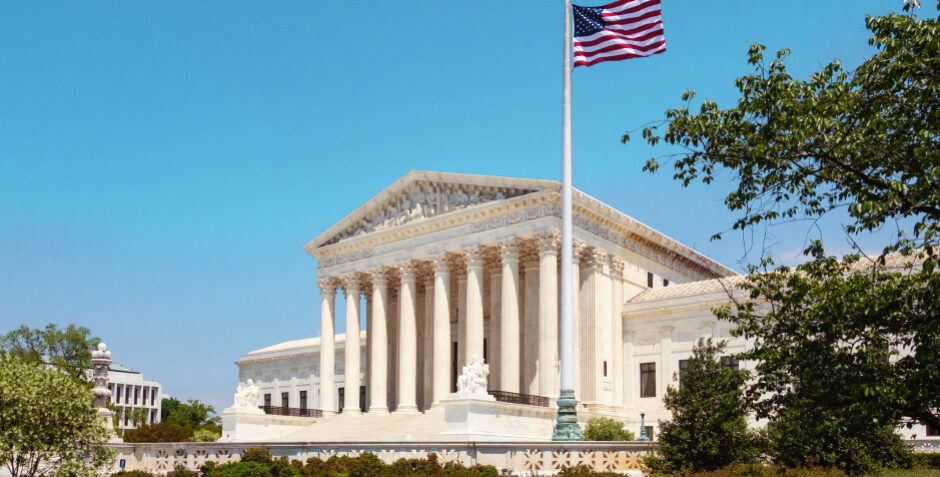Supreme Court Issues Major Decision Protecting First Amendment Associational Rights Against Cancel Culture
This is a major Supreme Court victory for conservative organizations nationwide, protecting the freedom of speech from the pervasive attack of cancel culture, a battle the ACLJ has been engaged in for many decades.
The Supreme Court of the United States just ruled that California’s Donor Disclosure law violated the First Amendment right to privacy in one’s political associations. The decision in Americans for Prosperity Foundation (APF) v. Bonta and Thomas More Law Center (TMLC) v. Bonta represents a major victory for all charities, but particularly for those advocating for conservative and other causes disfavored by the political elites. The Court’s decision resoundingly reaffirms that the right to advocate anonymously for one’s political beliefs is an essential First Amendment value.
As we explained here, the cases arose because California is one of a few far Left-run states that required all charities to submit lists of their major donors. The information should not be publicly disclosed but California had no law in place to ensure the information’s confidentiality. Instead, the state hired students, contractors, and seasonal workers to upload the information on unsecure websites. Unsurprisingly, the information was easily hackable and immediately exposed the organizations’ donors to the threat of harassment and retaliation. Both APF and TMLC had experienced such harassment, including death threats, against their donors and employees in the past. California’s carelessness escalated the threats exponentially.
As we have previously detailed:
If you follow the news, you know that retaliation against those with unpopular political views is on the rise. Even some of our nation’s elected leaders promote the harassment of those with conservative political views. Doxing (exposing the private information, often on the Internet, of individuals with whom one disagrees) is pervasive and it empowers the harassment of people in their homes and places of employment. Recent examples include Rep. Maxine Waters encouraging retaliation against Trump cabinet officials and Rep. Joaquin Castro’s doxing of Trump donors.
Now, in a monumental victory, the Supreme Court has agreed that this kind of targeting is real and must not be tolerated, protecting donors to conservative causes from further harassment for their views.
In its opinion, the Court recognized the risk of harassment that pervades society today: “Such risks are heightened in the 21st century and seem to grow with each passing year, as ‘anyone with access to a computer [can] compile a wealth of information about’ anyone else, including such sensitive details as a person’s home address or the school attended by his children.”
The Court also noted the sheer number and range of organizations – including the ACLJ – filing amicus briefs supporting APF and TMLC. “Far from representing uniquely sensitive causes, these organizations span the ideological spectrum, and indeed the full range of human endeavors. . . . The deterrent effect feared by these organizations is real and pervasive, even if their concerns are not shared by every single charity operating or raising funds in California.”
The Court concluded that the California donor disclosure requirement “imposes a widespread burden on donors’ associational rights” and that California’s interest in “amassing sensitive information for its own convenience is weak.”
In his concurring opinion, Justice Thomas agreed with our amicus brief that the First Amendment requires disclosure laws like California’s to be subject to the most rigorous scrutiny under the First Amendment. In our brief, we argued that the Court should grant the highest level protection for those who associate with others to advance political causes and do not want to become the target of harassment from political opponents. Justice Thomas agreed with the majority opinion, however, that even under a lesser standard of scrutiny, California’s requirement was still unconstitutional.
Justices Alito and Gorsuch also concurred, stating that “California’s blunderbuss approach to charitable disclosures . . . is facially unconstitutional. The question is not even close.”
With your invaluable support, we fought the IRS when it targeted Tea Party groups for discriminatory treatment because of their political views. We filed two amicus briefs in this case in our ongoing fight to protect Americans’ right to freely associate with others without fear that they will be retaliated against for their political associations. Hopefully, one day cancel culture and the threat it poses to our most cherished freedoms will be an unpleasant but distant memory.

